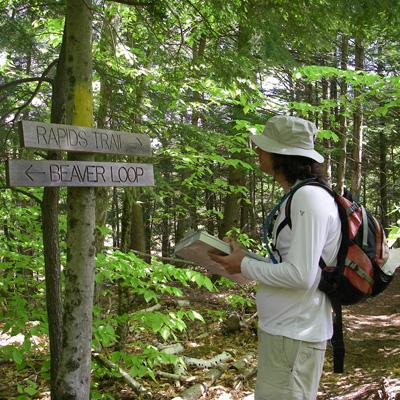A Scorecard to Assess Recreation Impacts on Forest Landscapes in the Northern Forest

Outdoor recreation is a vital part of the social and economic fabric of many Northern Forest communities by contributing to our economy, well-being, and environment. The ability of recreation trails to provide these benefits in the future is jeopardized by increasing use of trail systems, concern over environmental impacts, loss of access to private land, and debate about appropriate recreational uses on public lands. Natural resource managers lack monitoring tools to help ensure that trails are sustainably managed to protect the environment and maintain visitor safety and enjoyment.
To fill this gap, NSRC researchers created the Recreation Trail Stewardship Scorecard to measure the impact of trail-based recreation and provide a simple, yet science-based, assessment tool for measuring impacts of recreation. Researchers sampled 112 trail segments (55 motorized, 26 mountain bike and hike, 31 hike-only) in Maine and New Hampshire. They reduced a long list of variables measured to five statistically and scientifically important, practical and easy to measure, and socially relevant indicators for the Scorecard: wet and muddy areas, soil erosion, water quality at stream crossings, trail safety at stream crossings, and trash and litter.
On average, motorized trails had higher Scorecard scores (worse trail conditions) than non-motorized trails. However, the worst raw scores (worst trail conditions) were found on hike-only trails. Well-designed and managed motorized trails may be in better condition with fewer ecological impacts than poorly designed hiking trails. To aid in trail management and environmental stewardship, natural resource and recreation managers can find further results, the Scorecard, and a user's guide at www.manometmaine.org/rec.html.
Download printable version [PDF]
Download full final report [PDF]
